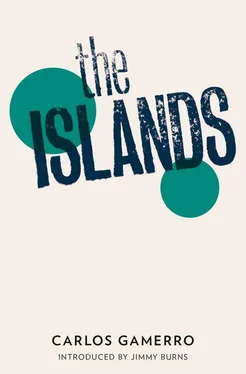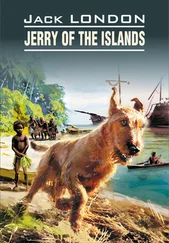‘Stand back,’ he shouts.
I move my mouth, several times I think; my voice sticks in my throat.
‘You … can’t … bury him. You didn’t kill him.’
‘What? The fucker’s still alive?’
‘No. Dead. But you don’t … didn’t kill him. We killed him.’
‘That doesn’t make him one of us. Sorry. Hey, I thought you Argies only spoke Spanish.’
‘We did. Can we bury him somewhere else, please. He was my friend. I’ll dig his grave on my own.’
‘We’ll dig them up and separate them once we’ve cleared up here.’
I insist for bit longer, but the war has tossed my life at me like a coin to a beggar, and it isn’t willing to concede anything else. We’re spading the first shovelfuls of peat on the bodies when one of us, feeling dizzy, sits down to rest on the crumpled blankets that cover the pile and shouts.
‘There’s one here.’
It’s Hijitus. It’s the only name I know to say goodbye to him. We make room for him — he doesn’t take up much — and finish covering them with peat, in a big mound of heavy clods almost a metre high. And there they stay: our friends, companions, foxhole mates, even our hated officers, in the only piece of Malvinas soil they’ve managed to make theirs. My whole world has shrunk to the size of that pit and, when I finish, I stick the spade in the ground and look for something to make a cross. The Englishman understands what I want.
‘A helmet, put a helmet on it.’
He orders us to walk over the mound to stamp it down a bit, the way you do with the soil round a freshly planted tree. Bumping into and tripping over each other like blind zombies locked in a small room, the four of us walk round the metal tree, within the imaginary boundary drawn by the Englishman in the mud, sealing the tomb with the prints of our soles like sealing a letter with wax. The Englishman shouts something, but no one can hear him in the air that disappears and the howling whistle that’s perforating our eardrums. Everything happens very slowly. I see the Englishman dive between the rocks; my three companions throw themselves face down in the mud. From up here I watch the motionless bodies with curiosity: erect above the devastation, I might pass for the last inhabitant of a dead planet. The whistle from the shell grows in intensity: judging by the direction, it’s one of ours, but I can’t see if it’s a shell or a 105mm. They must have found out about the storming of the mountain, which, as far as they’re concerned, is now an enemy position. This first shot is lucky for us: it falls nearby but the shrapnel doesn’t hit us, we’re well protected. I feel something hit my helmet, no harder than a rap of the knuckles, but it must have dented it a bit because straightaway it feels too tight and, when I try to loosen the strap and take it off, my clumsy, numb fingers slip on the buckle. Someone once told me that it’s as well to leave the strap undone in combat because, if you get hit in the helmet, the jolt can snap your neck. Fortunately it’s nothing like that, I’m fine, just a slight dizziness, like when you try to read a book with small print in a moving car, so I decide to sit down on the trampled mound and have another go at that strap. Our artillery keeps on firing, but now the shells are falling behind our backs. The English, it seems, haven’t been as lucky as us: one of them’s lying on the ground and his companions are trying to open his jacket, their hands slipping in the blood. Now that they’re occupied, it would be so easy for us to grab the rifles just lying there and shoot them, but my companions haven’t got up yet from the pile in the mud and I’m still busy with this buckle. Maybe if I rest a little first, I’ll find it easier; I haven’t had a wink all night and it won’t hurt anyone if I have a few minutes’ kip. Besides, the freshly dug-over earth, though cold, feels quite soft under my legs, and I let myself fall slowly until I’m lying on my back. My helmet feels even tighter than before, as if it’s stuck to my skull, and the strap cuts into my Adam’s apple and I find it difficult at first to breathe, but I soon get used to it. As I drift off to sleep, I have a good idea: I’ll stay here and play wounded till the English come and pick me up. They’ll treat me well, I speak their language, and they may even give me a few swigs of the old Gineva Convention and a cigarette; I’d prefer a cigar, thanks. With my arms stuck to my body and my legs crossed to keep out the cold (that particular cold that affects the body when it’s gone for many hours without sleep) I could pass for a cigar myself, and I begin to levitate from the fatigue, first my feet, floating up there of their own accord and dragging the rest of my body with them before it levels out. Then, head first, I begin to sail through the air, flying as in a dream, manœuvring effortlessly, like a zeppelin on a windless day. I don’t need anyone to lead me, I think to myself, I can find the way by myself, there’s no way I can get lost, like an unwanted dog a long way from home, my instinct will lead me straight back. Cruising at this speed all day, I can be in Buenos Aires by nightfall; perfect, I’ve always liked seeing the city lights from the air, like an inverted sky with the stars on the ground. The war’s over, the war’s over, I repeat to myself in the lullaby of the explosions and, cradled in that certainty, I curl up on my side to keep the cold at bay, with my thumb for a cigar, and fall asleep on everyone’s grave.
Chapter 16. THE RECOVERY OF THE ISLANDS
I awoke numb with cold, waving clumsy tortoise legs in the still air and getting nowhere. I tried to turn over but only managed to bang my head on the concrete floor. The thud, strangely non-metallic, reverberated in the stillness. I couldn’t remember taking my helmet off; perhaps someone had done it for me. Little by little, with an effort that felt like lifting my whole body off the ground, I half-opened one eye. In the distance the steep vertical sides of Mount Longdon rose skywards in shadow, a single light shining at the summit like a lighthouse for navigators. Who was it that had carried me or helped me to walk down? Or had I done it by myself and then passed out from the effort? But then why was I naked when the English had only been taking our jackets and bootlaces? I stretched up one blind hand and it immediately closed on the texture of cotton cloth hanging there in the void. A pair of hands in my armpits helped me to sit up and, raising my weak arms and struggling to get them into my sleeves, began to dress me like a child. As I couldn’t raise my chin from my chest, I could see nothing more than the angel’s shoes, a pair of dry, cracked boots laced up with plastic string, brushed by fraying cuffs held together by a matting of dirt. He was one of ours then; the English must have turned their noses up at boots in such bad condition. He covered my shoulders with my jacket and then, laying me down again, lifted my legs to pull on my trousers and socks.
‘Don’t know what happened to your boots,’ rattled his familiar voice.
‘The English,’ I croaked.
He laughed, a low, hollow laugh that ended in a bronchial coughing fit.
‘You too?’
I knew that, if I made a superhuman effort, I could lift up my head and see him, but the urge wouldn’t go beyond the words in my mind. I only had enough strength left to feel the pain, an old, dull pain, less of a present pain than the memory of a pain so strong it still hurt. Two hooked hands hoisted me up; an evil-smelling body supported the weight of mine.
‘Can you walk?’
I discovered that I could copy the other man’s steps, keeping my socks on the floor, slumped over his shoulder. A see-sawing marine horizon with reflected lights was trying to find its balance before my eyes. We must have been coming into the town then. I turned to my companion for confirmation. Bushy beard, more than two months’ growth, peg-toothed smile.
Читать дальше











